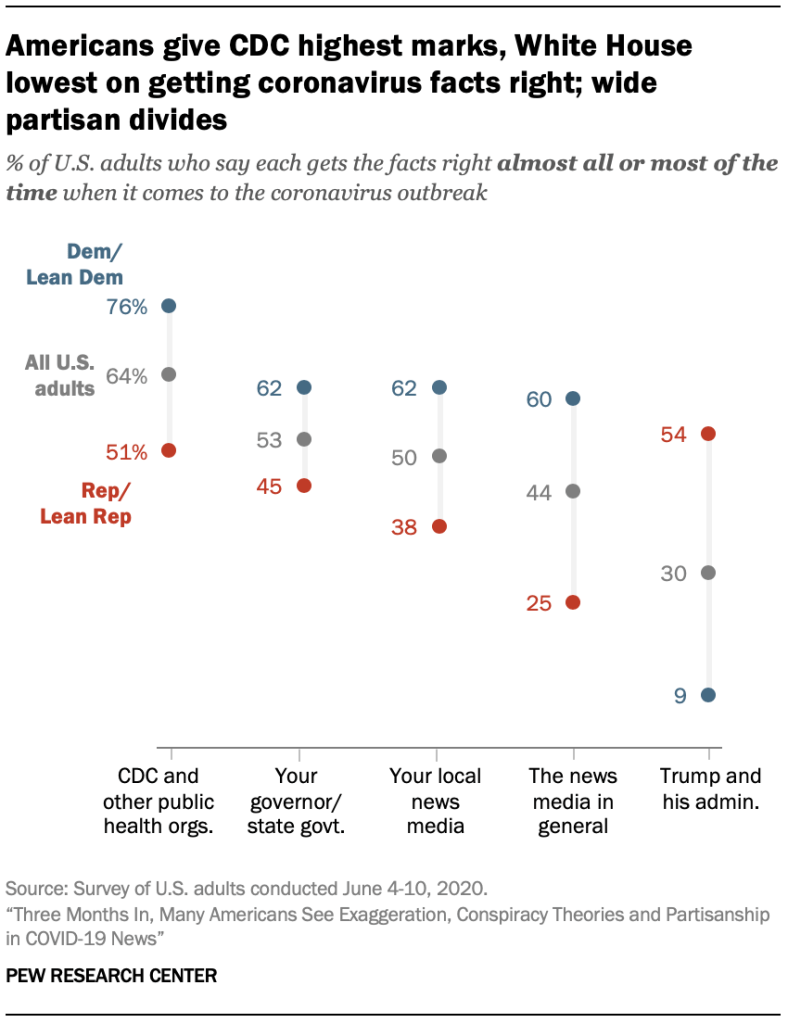BOSTON (CN) — One-quarter of American adults believe the coronavirus pandemic was probably created intentionally as a way for powerful people to make money, the Pew Research Center reported Monday.
Although this conspiracy theory has been widely debunked, some 5% of Americans believe that it is not just “probably” but “definitely” true.
The survey shows that Americans are still very interested generally in news about Covid-19, but they believe reporting about it has become increasingly political and they aren’t sure where to turn for accurate information — factors that help explain why an unlikely conspiracy theory has taken hold.
A majority of Americans don’t believe the news media are getting the facts right, the poll found. Only 44% trust the media generally to provide accurate information about the outbreak, although slightly trust their local media more than they do the national press.
The Trump administration fares even worse, with only 30% treating the president and his aides as a reliable source regarding the pandemic.
Some 64% have faith in the Centers for Disease Control and Prevention and other public health organizations — a higher number to be sure, but one that still means that more than a third of Americans don’t have the same trust.
And governors and state governments were judged as accurate by only 53% of their constituents.
An overwhelming majority of Americans — 86% — say they continue to follow news about the coronavirus at least fairly closely. Some 39% say they follow it very closely.
They also say that the problem of partisan information has gotten worse. Some 41% of Americans think there is more partisan information in the news now than at the beginning of the outbreak, and 38% say it has become harder to tell what the truth is. Only 22% say the news about Covid-19 has become less partisan.
There is a big difference in whom Republicans and Democrats believe. Some 54% of Republicans trust officials of the Trump administration, for instance, versus only 9% of Democrats. Still, the fact that nearly half of Republicans don’t trust the Trump administration is significant.
As compared with Republicans, Democrats voiced far more belief in the news media (60% to 25%), and they are also more trusting of state governments (62% to 45%) and public health organizations (76% to 51%).
A growing number of Americans believe the severity of the pandemic has been exaggerated: some 38% in June versus only 29% two months ago.
Again, there’s a significant difference between Republicans and Democrats. Fully 63% of Republicans believe the problem of Covid-19 has been overstated, whereas only 18% of Democrats feel that way.
The number of Republicans who feel the disease has been excessively hyped jumped 34% in the last two months. Although far fewer Democrats believe the problem has been exaggerated, the number who do rose 28% during the same period.
The Pew poll inquired about the conspiracy theory making the rounds that the pandemic was deliberately planned, which was promoted in a 26-minute video called “Plandemic” that was posted to social media in early May. Some 71% of Americans say they have heard about this theory, and 19% say they have heard a lot about it. People who get much of their news from social media are more likely to be familiar with it.
Among people who have heard of the theory, some 36% say it is definitely or probably true. A quarter of American adults believe that it is at least probably true, and 5% say it is definitely true. Another 9% say they’re not sure.
Republicans are more likely to believe the theory: Some 34% of Republicans in general say the theory is likely correct, versus 18% of Democrats.
The “Plandemic” video has been removed by multiple platforms including Facebook, YouTube and Twitter. Both Science magazine and PolitiFact have identified numerous false and misleading claims in it.
Although the poll results may be surprising, there have been many instances in the past in which polls have shown that a large number of Americans believed in a conspiracy theory, such as the U.S. government’s alleged complicity in the 9/11 attacks. In 2013 a poll found that more than 10% of Americans believed that the government was involved in the deaths of entertainers such as John Lennon and Tupac Shakur, and that world bankers were slowly eliminating paper currency to force people into slavery.
Other recent Pew polls have shown that Americans are receptive to conspiracy theories. For example, Pew found that 32% of Americans believed that the delay in reporting the results of the Iowa Democratic caucuses was caused by a deliberate conspiracy, while an additional 28% of Americans were “not sure.”
A Pew poll in February found that 25% of Americans believe that Ukraine probably interfered in the 2016 U.S. election. Although this claim is complicated, PolitiFact has rated the most serious charges “false.”
Joseph Uscinski, a professor of political science at the University of Miami, said susceptibility to conspiracy theories is fairly common for a significant portion of Americans, but primarily those with less wealth and education. Those who believe one theory also tend to believe a lot of others.
Observing that Pew’s latest findings are consistent with data he saw in March, Uscinski said in an interview: “The good news is the number is not going up, but the bad news is it’s not going down.”
As compared with other popular theories about vaccines and 5G networks, Uscinski said belief in Covid conspiracies is on the high side. He attributed this to the fact that the disease has been in the news so much and has had such a large effect on people’s lives. “But it’s nowhere near the level of belief in JFK theories, which can reach 50%,” he added.
The Pew survey polled 9,654 people from June 4 to June 10 with a margin of sampling error of 1.6%.
Subscribe to Closing Arguments
Sign up for new weekly newsletter Closing Arguments to get the latest about ongoing trials, major litigation and hot cases and rulings in courthouses around the U.S. and the world.










